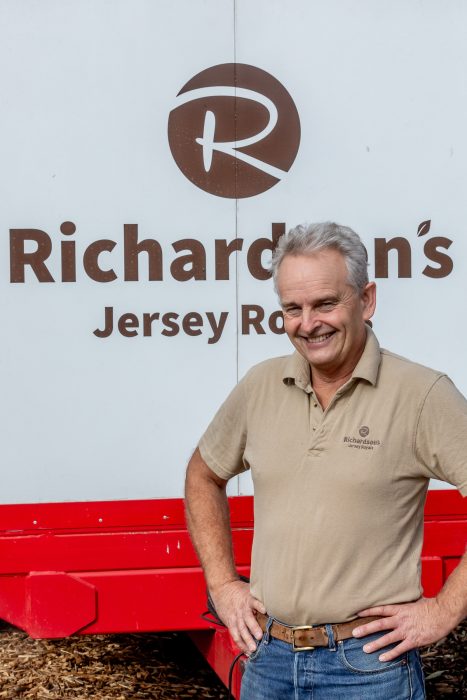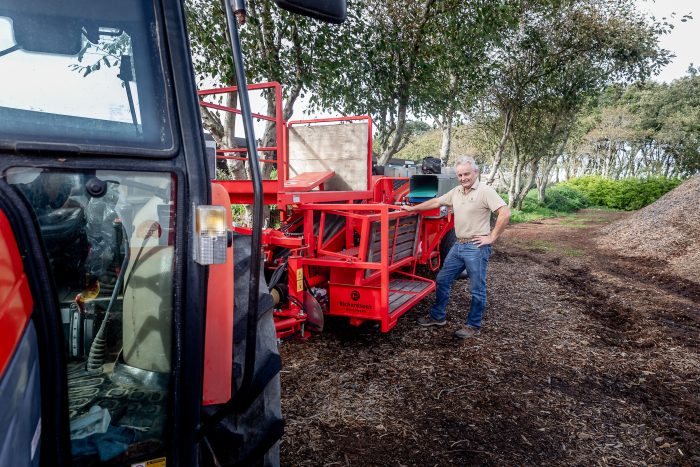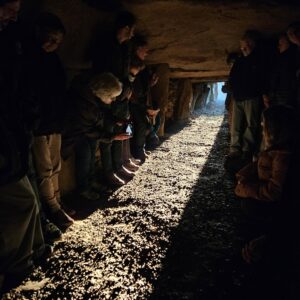At the annual general meeting of the Jersey farmers Union in December, St Ouen farmer Dougie Richardson was elected president. He was interviewed afterwards by Alasdair Crosby. This article appeared first in the Jersey Evening Post and is reproduced here by their kind permission

NEW business plans, energy and innovative ideas abound, as the recently elected Jersey Farmers Union (JFU) president, Dougie Richardson, chats about the future of Island farming.
‘Jersey’s farming heritage is deeply ingrained and all of us involved are determined to find new ways to drive this legacy forward for the next generation,’ he said. Farming incomes are under ever-increasing pressure, so I and many of my fellow farmers have a strong desire not merely for the industry to survive, but to thrive.
‘If you invest in farming, your society will be a lot better off for it.’
Fortunately, that investment has recently happened, in November, with a States vote to give the farming industry a £6m financial package proposed by Deputy Steve Luce (together with a further £700,000 for the fishing industry). Needless to say there has been a considerable uplift in spirits as a result.
Farmers’ spirits had been very low, Dougie said. If the funding hadn’t been agreed, the farming industry would have been just about finished. Hence the effort that was made to bring a proposition to the States – it was the first time that the entire industry, including the fishing industry, represented through the JFU, the RJA & HS Jersey Dairy and the JFA had worked so tirelessly behind the scenes to make the proposition happen, and fortunately secure new funding that was most definitely needed.
He paid tribute to the efforts of retiring JFU president Peter Le Maistre, for guiding the industry through the problems of recent years, and in helping to secure the new funding, just before his retirement.
Dougie continued: ‘Now we all feel that we have turned a corner, particularly with the reintroduction of States Agricultural Loans. From the day these were scrapped, I was always going on about it, always making my voice heard, and letting politicians know that this was really not a good idea. We’ve had 20 years on the wrong trajectory. Crazy!
‘Whatever else in the way of low-rate lending which might be available, you just cannot beat a States Agricultural Loan, now back at an attractive rate of 3% from a fund of 10m, farmers can invest in the future. When you are pressurised to produce affordable food, you certainly need affordable finance – that just goes without saying, considering all the costs involved.
‘The reintroduction of the loans is very welcome – and I have even heard farmers already discussing applying for a loan to expand or invest in their businesses.‘
Dougie added -‘The establishment of the Rural Forum was a great idea; it is comprised of government and rural industry representatives and amongst other things overseas the Rural Support Scheme’
The vote to agree the funding was passed unanimously 43 in favour with one abstention.
Dougie continued: ‘from 1993 successive rounds of politicians had reduced support from levels that ensured we could compete, to recent levels which ranked Jersey in third place behind Australia and New Zealand in terms of per capita support and mean we absolutely can’t. Hence, the disappearance of many of the crops we used to grow and subsequently a greater reliance on imports. Which ironically, if from Europe, are heavily subsidised! Operating as we do in a high-cost jurisdiction and especially with recent high wage costs, the politicians didn’t appreciate what the consequences would be of doing so. Now, this generation of politicians are seeing what the consequences have been – and they are quite dire! I think they have no desire to repeat that mistake. So, in the same way that food production was encouraged in the 1950s, after the War, because it was desperately needed, the Island is now desperately concerned about food security once again. People are now realising: “Hang on, I think we have overdone it! We had better change things – and pretty quick!”
Succession planning – getting young people into farming – is self-evidently vitally important, given the average age of growers is in the middle-aged to young-elderly bracket.
‘It’s one thing to get new blood into farming,’ Dougie said, but you’ve also got to keep them in. Farming has to be attractive, so we need to secure better returns from the marketplace. I am heavily involved in trying to do that… as most people who know me are already aware!’
‘With being able to get government assistance to invest and to accelerate things going forward, there’s no reason at all why, in a couple of years, agriculture in the Island couldn’t be a completely different looking picture. At the moment, we have some hope for the future, but there could be more than that – there could be real, huge excitement for the future – if we can get stability in the marketplace and if we can get those better returns and open up new markets.
‘That is what we are trying to do – we are trying to make it more attractive for everyone. There is a general feeling that farming needs to be looked at afresh, and that we need to take stock.
‘I think, for example, that SCOOP [Sustainable Co-Operative] is a great initiative that demonstrates new ways of supporting emerging growing talent. If we can keep the older farmers farming for a bit longer, they will be the bridge to the next generation. We can’t lose the oldies now – they’ve got to hang in there.’
And his own age?
‘62. But I do get out in the fields quite a bit, especially at digging time, even though I have to spend a lot of time in the office.
§
So, what is the function of the JFU, exactly?
Dougie said that it had a number of functions: one of the most important was the recruitment of labour, which took an enormous burden off individual farmers, since it was an enormously time-consuming process to find the labour force; the industry was being forced to go further and further afield.
Due to astute decisions of past presidents and treasurers there have been some wise investments made, and so now the JFU is in a good position to be able to help growers with certain aspects of their work, such as staff training, and the JFU contributes to a lot of costs incurred by the farmers – making it very good value for money for the industry. It is also there to represent the membership and lobby on issues. Such as the increases in freight charges, as announced recently by Condor.
Yet another issue is the minimum wage, which has recently increased by 10.9%.
Dougie added – ‘Given that the Minimum Wage was £8.32 in 2021 and will be £11.64 in 2024 this represents a staggering 39.9% increase. On top of this our Social Security Employer Contributions increase as do our Employer Liability premiums increase in line with this also, costs spiral upward very quickly.’
Problems for Jersey farmers remain acute. For example, another prominent local producer has recently ceased production, citing wage costs that are now too high, and which make the cost of local produce uncompetitive as compared to imported produce.
The JFU has written to the Minister for Economic Development and asked for a meeting in the New Year. Dougie is hoping to meet all the States Members in the first 12 months of his presidency – he is convinced that ‘communication is everything’.
‘ I am looking forward to working closely with the other industry leaders and government to help secure a prosperous future for all involved’
§
Dougie’s name is perhaps best known by local consumers for his bags of Jersey Royals. The logo ‘Richardson’s Jersey Royals’ is printed on the small brown paper bags, on sale at outlets throughout the Island that contain the potatoes he harvests.
Ultimately, he is hoping to supply the potential European market in the same way – indeed, as he says why not the whole world? His ambitions are not modest.
‘The best way to secure the future for the next generation of farmers is to get more from the marketplace. If you sow that, you will reap a great reward.’
We’ve got a product that is really good, and – even better: we have something that will give the next generation of farmers some real optimism and hope for the future.’





